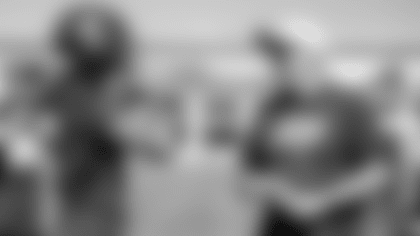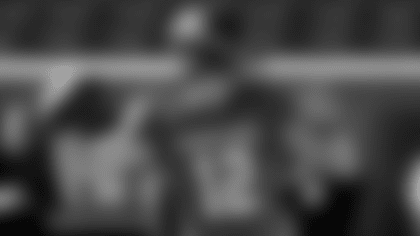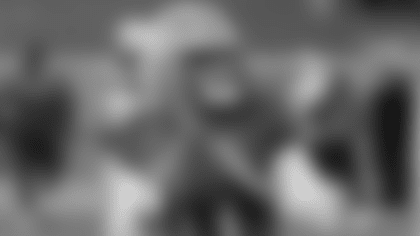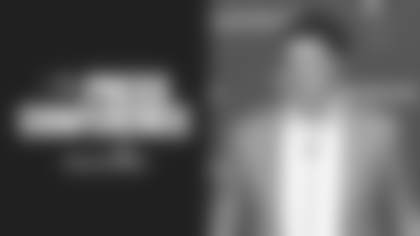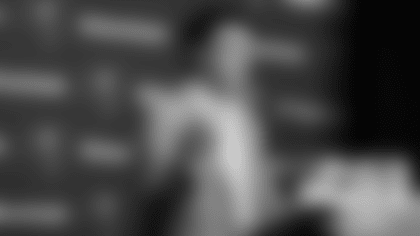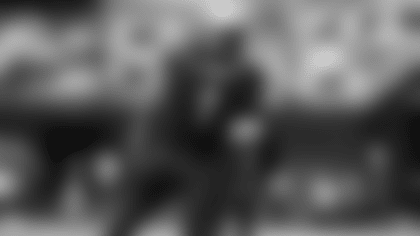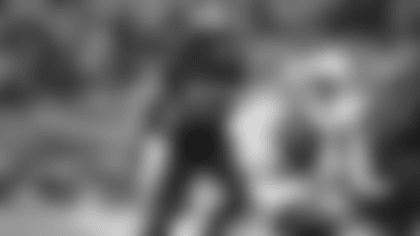The Answer Man, as long-time readers know, is a big fan of the unusual play wherever it happens around the NFL, especially when it is clearly the product of preparation, daring and thinking outside the box.
In Green Bay in 2000, for instance, the Bucs ran a two-point conversion play that involved Warrick Dunn taking a handoff from Shaun King and starting forward before handing the ball to Mike Alstott cutting left to right. Alstott ran around the end and, as he was approached by a defender, made an option pitch to King, who had sneakily shadowed him to the outside after handing off. Beautiful stuff, well-rehearsed.
Last year, as we have discussed several times in this column, Washington return man Chad Morton ran out of bounds then reached back onto the field to grab a bouncing kickoff, knowing that doing so would result in a penalty on the kicking team. Incredibly savvy.
On Sunday in Atlanta, the Answer Man learned that a coach could throw a replay challenge flag to claim that there were 12 men on the field for the opposition. Jon Gruden did that against the Falcons and it worked. Straight-up rulebook knowledge, that one.
And then there was the best "heads-up" play of the season, and one of the best of all-time, at least statistically. Two weekends ago, the San Francisco 49ers lined up to try a 52-yard field goal on the last play of the first half in Chicago. Both offenses had struggled mightily in the half due to heavy winds in Soldier Field, and the 49ers had a 3-0 lead they could have taken into the locker room.
Instead, Joe Nedney's long field goal attempt was blown short and to the right…and right into the hands of cornerback Nathan Vasher, who had sprinted back to the end zone at the snap. As he was allowed to do, Vasher returned the ball out of the end zone and started on what would prove to be a very long stroll around the greensward.
Yes, you can return a missed field goal if you catch it in the field of play. It's not a strategy used often because the rewards are rarely worth the risk. Obviously, it's going to have to be a long field goal in most cases for the ball to come down in the field of play and not somewhere beyond the end zone. And on missed field goals, the other team gets the ball at the point where it was kicked, which is already good field position. Why give up a starting point of the 42 to run a kick out of the end zone and maybe get tackled at the 20?
In this case, though, there was no downside, beside the miniscule risk of a fumble returned by the kicking team for a touchdown. The half would end as soon as the play did. So Vasher could take a stab at returning it all the way for a touchdown, with nothing to lose if he didn't make it. And he did make it – 108 yards later, marking the longest play and touchdown of any kind in NFL history.
The Answer Man loves plays like this for two reasons. One, they're thrilling to watch. And, two, they usually lead to a pile of questions in my e-mailbag, as the Chad Morton play did. In this case, though, I have to give one of my readers his due props for the following question, because he sent it in a few weeks before Vasher's big play. Very prescient. To wit:
Mikael Sandstrom of Orlando, Florida asks:
Answer Man, answer this! Have the Bucs ever caught a missed field goal and returned it for a TD? And...make a prediction: When will the Bucs return a kickoff for a TD?
Answer Man: Nope. The Bucs have never scored in that manner, but they did almost pull off a similar play, one that was definitely the product of preparation and daring.
On November 12, 2000, the Bucs played host to the Green Bay Packers in Raymond James Stadium. Green Bay got the ball first to start the game but was stopped at the Bucs' 39, leading to a punt.
Now, the Bucs had noticed during their videotape study of those 2000 Packers that, when they punted a ball that was not caught by the return team, the cover men didn't always go through the motion of touching the ball down. Tampa Bay's thought: If the Packers started to walk away from the ball before anyone had touched it, then a Buccaneer player could run up, scoop up the ball and return it before any whistle was blown.
Well, it worked like a charm...with one minor problem. The Packers watched the ball roll down to the Bucs' 14, then left it alone. As they turned away, safety John Lynch ran up, grabbed the ball and took off down the left sideline. He had to weave through some Buc offensive players coming onto the field, but he scored easily on an 86-yard return.
The problem? Did we mention those offensive players coming onto the field? Both the Bucs' offense and the Packers' defense started strolling into place while Lynch was making his return, and thus both teams were flagged for having 12 men on the field. Had it just been the Packers who drew the penalty, the Bucs would have declined. Instead, the penalties offset and the Packers had to punt again, this time hitting it into the end zone.
So it didn't work out in the end, but it sure was smart.
As for the prediction, Mikael, I say this weekend against the Bears. Why not? There's no rational reason the streak has lasted this long, so it's not irrational to expect it to end in the very next game. Um, I think. I flunked logics in college back on the home world. Anyway, I'm an optimist.
Now, on to the rest of your questions.
**
- Rob of Conowingo, Maryland asks:
Does the intentional grounding rule apply solely to the quarterback? For example, suppose the Bucs run a reverse. Can the WR intentionally throw the ball away to avoid a loss?
Answer Man: That's a good question, Rob-Who-Apparently-Expects-Everyone-to-Automatically-Know-that-Conowingo-Is-in-Maryland. (I didn't, by the way, but now I know that Conowingo is situated in an area that was once the hunting grounds of the Susquesahanocks, who were members of the Iroquois tribe. And you can't put a price on that type of knowledge.)
Seriously, though, I like that question, even if it did send my helmeted head into the NFL Rulebook once again. I have to say, even armed with the Rulebook and its companion, the Official Casebook of the NFL, I can't find the answer spelled out directly. So this is my analysis, based on the following passages in the Rulebook:
*Rule 8, Section 3, Article 1: Intentional grounding will be called when a passer, facing an imminent loss of yardage because of pressure from the defense, throws a forward pass without a realistic chance of completion.
Note 1: Intentional grounding will not be called when a passer, while outside the tackle position and facing an imminent loss of yardage, throws a forward pass that lands near or beyond the line of scrimmage, even if no offensive player(s) have a realistic chance to catch the ball (including if the ball lands out of bounds over the sideline or the end line).*
Yes, the bold-face type is my addition, and it's the center of my analysis. At no point in any of the intentional grounding passages (and there are several more that define specific little situations), do the rules say "quarterback." It's always "passer." To me, that means "anyone passing the ball." In fact, a passage from Rule 3, Section 21, Article 3 supports my position. This section of the rulebook is a list of definitions, and it defines "passer" this way:
A player who makes a legal forward pass is know as the Passer until the pass ends. The teammates of any player who passes forward (legally or illegally) are known collectively as the Passing Team or Passers.
It also helps my contention, I think, that in many other places in the Rulebook, there are specific references to the "quarterback," and not just "passer." For instance, in the section regarding players on and near the line of scrimmage moving before the snap (something we've discussed recently), it is the "quarterback" who is told he can't falsely extend his hands to receive the snap in order to draw the other team offside.
Another piece of evidence in my favor: The epic 49ers-Giants playoff in 2002, the one that sent the 49ers to Tampa for a Divisional Playoff trouncing. In that game, a botched snap killed a field goal try for the Giants in the game's closing seconds, sealing a 39-38 San Francisco win. Punter Matt Allen, desperately trying to make something out of nothing, threw the ball downfield. An offensive lineman almost caught the ball and appeared to draw an interference call, giving the Giants knew hope, but the penalty was actually on the lineman for being an ineligible receiver downfield.
Anyway, an announcer suggested at the time that what Allen should have done – as if he possibly could have thought of this at the time – was spike the ball to kill the clock. That announcer was wrong; you have to take the snap from under center in order to use the spike, which is specifically allowed in the rules. If you do that and you're not under center, it's intentional grounding. The relevance of all this? The theoretical application of the grounding rule to a non-quarterback. The ensuing debate eventually clarified that Allen would have had to run outside the tackle box and throw the ball away towards the line of scrimmage, but the point was that the rule applied to him, too.
**
- Joe Gibbons of Chuluota, Florida asks:
Question of the all-knowing: I don't understand - why did the 25-second play clock all of a sudden revert to a 40-second play clock in the final minutes of the Miami-Tampa game? As a member of a group of season ticket holders driving from Chuluota to Ray Jay every Buc home game, we were at a loss as to understand this rule. Please, wise master - enlighten the "I-4 Travelers."
Answer Man: Oh, I-4 Travelers, I have some mundane powers, but I am far from all-knowing. To answer your question, all I had to do was know where my NFL Rulebook was, and since I just used it on the question above, no problema.
Besides, I don't want to seem too snooty about this one, because I have to admit that I've always been a little confused by the 40/25 thing. As it turns out, it's very simple. At least this one time, I have to say: "Thank you, NFL Rulebook." Don't expect to see that very often in my columns.
Here's the whole deal. The NFL operates on a 40-second play clock. That is, once one play ends, the offense must snap the ball for the next play before 40 snaps have elapsed. An official on the field will give the signal when a play has ended and the clock operator in the press box will reset the play-clock to 40 seconds. This is in effect at all times, even in the final two minutes.
However, if one play ends with a clock stoppage – the Rulebook suggests such possibilities as a time out, a change of possession, an injury, a measurement or a referee's timeout – the play clock becomes a 25-second clock. That is, when the delay is over and the referee signals a resumption of play, a 25-second time limit will begin ticking down on the offense.
Obviously, I can't know the specific instances to which you refer, but I'm looking at the last two minutes of the game on the play-by-play and I don't see any administrative stoppages. The Dolphins were obviously trying to hurry up, down by two touchdowns in the last two minutes, but it was pretty straightforward action. The 40-second clock should have been in effect, and apparently it was.
**
- Richard Schilling of Bethlehem, Pennsylvania asks:
**Answer Man, break out the rule book. In the fair catch scenario that caused Pittsburgh some grief recently, the returner of a Pittsburgh punt signaled for a fair catch. The ball bounced off the returner into the air and was caught by a Pittsburgh player. The player was penalized for interference because the returner is entitled to the ball.
The point in need of clarification is extent of the returner's right. Does the returner own the ball until it hits the ground, or can the officials determine that at some point before hitting the ground (such as bouncing 20 yards away in the air) the ball is uncatchable? Now to the Fantasyland question. Could a skilled returner (perhaps with juggling experience) "accidentally" bobble a fair catch in such a way that it hits an opposing player (like the ones that crowd around awaiting a dropped ball) and get an interference call?**
Answer Man: Rich, did you move? I just got my computer's spell check to accept "Breinigsville," and now it's Bethlehem?
It's been a while since our last exchange, but you're still bringing it with excellent questions, so let's attack this one. The funny thing is, I had just stumbled across the very rule that applies to this question a few days ago. No lie.
And I don't really have to "break out" the rulebook because, as you see, I've been pretty much buried in it for most of this column. Let's get right to the relevant entry to the first half of your question, which is Rule 10, Section 1, Article 4, Supplemental Note 2:
After a valid fair catch signal, the opportunity to make a catch does not end when a kick is muffed. The player who signaled fair catch must have a reasonable opportunity to catch the ball before it hits the ground without being interfered with by the members of the kicking team.
Obviously, that's the call that was made in the Steelers game. The rule appears to have been applied exactly right. In that case, it sounds like the ball bounced upward but not too far away from the return man; interestingly, if I read this rule right, it means a cover man also couldn't hit the returner if the ball was slipping through the returner's hands but he was still trying to grab it before it hit the ground.
Now, you ask if the officials could decide if a certain rebound off a player is uncatchable, and therefore not a penalty. My interpretation of the rule I typed in above is yes. The rule says the player making the fair catch has to be given a reasonable opportunity to catch the ball, even after a muff. If it has bounced off his helmet and flown 20 yards behind him in the blink of an eye, it's not reasonable to think he could get back there and catch it. If there is a member of the kicking team standing 20 yards behind the receiver and the ball flies right to him, he should be able to catch it and, presumably, score.
There are a few entries regarding this rule in the NFL's Official Casebook, the companion to the Rulebook that provides some examples of potential plays in order to clarify the rules. In each case, it is worded carefully to say the player signaling the fair catch had a reasonable chance to catch the ball.
As to the second part of your question, the one from Fantasyland, I have two reactions. My first reaction, and one that I still think is valid in a practical sense, is that it will never, ever, ever happen, so it's irrelevant. You can't convince the Answer Man that any NFL player who wanted to keep his spot on the roster would risk fumbling the ball away in order to draw a 15-yard penalty. No way anyone will ever try that.
However, my second reaction was to glance at the Rulebook, and there it was, right under the last passage I typed in. So here's Rule 10, Section 1, Article 4, Supplemental Note 3:
An intentional muff forward prior to a catch in order to gain ground is an illegal bat.
I imagine that was included to prevent a player from signaling a fair catch and then purposefully bobbling it as he ran forward, knowing he couldn't be interfered with. Still, it would apply to your question, as he would be intentionally muffing the ball and the referee wouldn't have to decide what his intentions were.
**
- Christopher of Tampa, Florida asks:
Me and a friend of mine have been having an argument about who's better, Simeon Rice or Julius Peppers (as you can tell he's a Panthers fan). Can you please give me some stats to back up that the red and pewter sack master is better?
Answer Man: No way am I taking that bait. As far as the Answer Man is concerned, both Rice and Peppers are truly phenomenal players, pass-rushers who can change a game in an instant. I don't see any point in saying which player is "better."
Some of the numbers are obvious, of course, and you can interpret them as you will. Peppers has the advantage of age (he's 25 and Rice is 31), but Rice has the greater career sack numbers (113 to 35.5), somewhat for the same reasons. This season, Rice has eight sacks to Peppers 5.5. Since Peppers came into the league in 2002, he has those 35.5 sacks while Rice has 50.5 in the same span.
Again, the Answer Man is not coming down on either side of your argument, even if his Buccaneer allegiance would lead him to favor Rice. Who is the better all-around player? The Answer Man doesn't consider himself a good enough of a scout to make that call.
Still, I suppose I can provide you with some raw stats, and you can do with it as you will. Since it's much harder to quantify how good a lineman is against the run, and since both of these players are best known for rushing the quarterback, let's just look at sacks. To make it fair, given Rice's longer career, we'll focus on sacks per game.
In 158 career games, regular season and postseason, Rice has 119 sacks. That averages out to .753 sacks per game, or one sack every 1.32 games.
In 58 career games, regular season and postseason, Peppers has 36.5 sacks. That averages out to .629 sacks per game, or one sack every 1.59 games.
Outstanding numbers any way you slice them.
**
- Zach Morris of Salem, Indiana asks
Dear answer man, I have a friend who is a die hard Colts fan, and refuses to let me live down the fact that Indy beat Tampa Bay in their most recent encounter. My question lies in the way that game ended, meaning of course in overtime when Mike Vanderjagt kicked a game-winner. As you know, Vanderjagt missed a field goal in overtime that would've given the Bucs the ball, but they called "illegal leaping" on Simeon Rice. That is obviously a rare penalty and I'm not asking for a history of that particular penalty. That would be a waste of both of our times, but simply the official definition of "illegal leaping."
Answer Man: So it would have been a waste of your time had I given a complete history of the illegal leaping rule? By that assessment, wouldn't about 90% of this column be a waste of time? Wait, don't answer that.
Actually, this one isn't too hard. Once again, it's straight out of the record book. Without getting too much into that oh-so-boring history of the rule, this one did evolve over time as teams looked for tricky ways to block a field goal. Did you know that it was once legal for a player to stand under the crossbar and try to leap and knock away a field goal if he could? Personally, the Answer Man thinks that should still be legal. (By the way, yes, that penalty is called "goal-tending" in the NFL, too.)
Now the NFL has made sure the defending team can't do anything too shady. You can't, for instance, have one player grab and pull a blocker out of the way so that another one can shoot through the gap that is created. And you can't leap off a teammates back to gain extra height (that one's called "Leverage.")
What the referees claimed Rice did (needless to say, not everyone shared their point of view) was indeed called "leaping." It's Rule 12, Section 3, Article 2(q), and I think one of the reasons the rule has met with some derision is it's name. It just seems weird to penalize a player in football – or any sport in that matter – for leaping. It's like drawing a flag for "running" or "trying."
What the rule differentiates between is (a) jumping in place and (b) taking a running start before jumping. Obviously, you see players on every field goal jumping up to try to block it. That's legal, as long as they're doing it without a running start and without hurling themselves onto the offensive players. Here's how the rule reads:
Cleary running forward and leaping in an obvious attempt to block a field goal or Try-kick after touchdown and landing on players, unless the leaping player was originally lined up within one yard of the line of scrimmage when the ball was snapped.
The rule is there to keep players from hurling their bodies over the pile and onto the offense, and is meant in large part to protect against injury. The ruling on the field is that Rice did just that, backed up, took a running start and landed on Colts players. Let's just say it was close.
**
- Sue of Hershey, Pennsylvania asks:
Never ask a question when a game is on... but this one no one could answer for me even after the game. Is there any reason a team can't "punt" a field goal? It would seem that if you can fake a field goal and a punt, why not? Sure would make things interesting.
Answer Man: "Never ask a question when the game is on?" Is that a rule in your household, Sue? I've never heard that one before. The Answer Man is constantly asking questions during a game, such as "How could anyone think Mike Alstott didn't get in on that two-point conversion?" and "Hey, is that the first kickoff return in NFL history that didn't draw a flag?" The only type of question the Answer Man hates to hear during a game is along the lines of, "Did you take out the trash yet?"
Yes, there is a reason that a team couldn't punt a field goal. The reason: Because then it would be a punt.
There are three types of kicks a team may try from scrimmage, as outlined in Rule 9, Section 1, Article 1 of the beacon of light we know as the NFL Rulebook. They are 1) punt; 2) dropkick, and; 3) placekick.
Now, forget the dropkick. We've discussed it a bit from time to time in this series, but it's not worth dwelling on because nobody ever does it.
A punt, as described in Rule 3, Section 26, is a kick made by a kicker who drops the ball and kicks it while it is in flight.
A placekick, as described in Rule 3, Section 23, is a kick made by a kicker while the ball is in a fixed position on the ground except as provided for a permissible manufactured tee at kickoff. The ball may be held in position by a teammate. (To that last part…well, duh. It would be pretty hard if field goal kickers had to one-time the ball as it was shot back by the long-snapper.)
A field goal can only be scored on a placekick. For proof of this, let's flip to Rule 11, Section 5, Article 1. This little ditty says the following:
*A field goal is scored when all of the following conditions are met:
(a) The kick must be a placekick or a dropkick made by the offense from behind the line of scrimmage or from a spot of a fair catch (fair catch kick).
(b) The ball must not touch the ground or any player of the offensive team before it passes through the goal.
(c) The entire ball must pass through the goal. In case wind or other forces cause it to return through the gal, it must have struck the ground or some object or person before returning.*
Again, forget the dropkick thing and please, no e-mails about the "fair catch kick." That is yet another very obscure rule that we covered in depth in Volume 13 more than a year ago. The Answer Man would also like to point out that part (b) of that passage above should be clarified to say that the ball can't touch an offensive player after the kick. But, hey, I'm not the editor.
But the point here is obvious. If you punt – that is, catch the ball, drop it and kick it in mid-air – then you are, well, punting. It doesn't matter if you were in field goal or punt formation. In fact, it's a fairly common strategy to have your placekicker "pooch" punt out of a field goal formation. The act you're describing, where the team lines up in punt formation but then goes for the field goal, just wouldn't work. Once the punter kicked it that way, it would be a punt.
Also, in case anyone is wondering, no it is not three points if a kickoff goes through the uprights.
**
- Steve Foy of Palm Harbor, Florida says:
**Mighty and wise Buc Answer Man:
Respectfully I write as I thoroughly enjoy your posts. In your most recent column, you correctly emphasized the name of our most sacred football contest by stating the following, "IT'S SUPER BOWL! SUPER-space-BOWL! It's only the greatest sporting event in the world (look out, here come the letters from soccer fans) and IT'S TWO FLIPPING WORDS!!" I overwhelmingly agree with you, and had hoped that you also abhor misuse of grammar and spelling. Yet, in the same posting, you also said, "You make a point of assuming that the strategy your suggesting can't be legal, and indeed it isn't." To that I say to you, "It's 'you're', not 'your', and not 'yore'. The grammar that you use here infers a noun and a verb, the words 'you are', contracted as 'you're'. The word 'your' implies ownership, as in 'your Little-Brown grammar guide'. Get it right. Kids are reading (hopefully).**
Answer Man: I cannot, obviously, argue with that point, Steve. In fact, that's an error that grates on me when I read it in somebody else's work. Yours was one of two e-mails to point this out to me, and both took a very righteous tone, I must say.
I can say, however – and you'll have to take my word for it - that it was a "typo" and not an error of ignorance. That offending nugget was contained within a 7,500-word document; it pains me that I made that mistake while typing, and it means I must do a better job of editing in future columns, but in the end I don't consider it a reflection of my knowledge of grammar, as it seems you do. Rest assured, the Answer Man knows that "you're" is a contraction that "infers" a noun (a pronoun, to be specific) and a verb.
By the way, according to my AP Stylebook and Libel Manual, when ending a sentence with a word or phrase in single or double quotation marks, the close-quote mark should follow the punctuation mark that ends the sentence. In other words, the correct phrase would be, "as in 'your Little-Brown grammar guide.'"
See, it can happen to anybody, even in a 150-word e-mail.
**
- Rick Webster of St. Petersburg, Florida asks:
**To Question 9 last week, your response ended "And, no, the quarterback does not count as being on the line of scrimmage when he's under tackle."
My Question is: When the quarterback is under tackle, whose responsibility is it to tap his butt and get him to move over to the center?**
Answer Man: Okay, yes, I got a little defensive about the previous correction, but I've got to admit, this one's a hoot. Very nicely done, Rick. Your funny (just kidding, Steve!).
That should read, "under center." The Answer Man doesn't know who would correct the QB if he lined up under tackle (I've seen clips of guys coming up behind the guard, but not the tackle). It's a good bet the tackle himself would have some choice words to say about it.
**
- Matthew Brewer of Cayce, South Carolina says:
In Series 3, Volume 4, you said that Carolina was tied for fewest numbers retired with 0. Didn't they just retire Sam Mills jersey this year against the Saints in week one?
…and Bill Konecy of Fort Myers, Florida piles on with:
**What do you win if you prove the answer man wrong?
In the Oct 21, 2005 ask the answer man, he said "Baltimore, Houston, Jacksonville, Oakland, Carolina and Dallas are tied for the least retired numbers, with none. " Ohhh the lies! The Panthers retired Sam Mills jersey (#51) in August of this year.
So what do I win? I should at least get a tour of RJS before a home game by the answer man himself!**
Answer Man: Okay, enough with the freakin' corrections already! And you win nothing, Bill. Nothing!
The Answer Man's source for retired numbers is the NFL Record & Fact Book, a hugely entertaining sourcebook that is published in the summer. Mills' number was retired after the R&F came out, and the Answer Man didn't catch the event. Sorry. You can remove Carolina from the list above and we can all live happily ever after, until someone invariably asks this question again in six months.
**
- Rebecca Smith of Durham, North Carolina asks:
My parents are Bucs season ticket holders and have been since 1976. So my mom notices the little things about certain players. Very interestingly, she noticed that at the last home preseason game and at the first home game this season against Buffalo, when Simeon Rice was introduced, it was announced that he went to Villanova. Now, I know he went to the University of Illinois, and my mom knows he went to the University of Illinois. We want to know why it was announced he went to Villanova. Was it a mistake on a part of the announcer or was it Simeon Rice's little joke to see how many fans were actually paying attention, leading fans like me to ask such a question to you? I've read his book, so it wouldn't surprise me if he did such a thing. He's one of my favorite players, and I was just curious about this. Thanks!
Answer Man: "University of Illinois." Say it fast. The Answer Man can almost see how that sounds like "Villanova," particularly out of giant loudspeakers in a stadium with 65,000 screaming fans.
That must be what happened, because Rice was announced as being from Illinois in both of those games. I didn't just assume that; I went to the source, the P.A. announcer and the people who feed him the lineup sheet. It was definitely announced as Illinois.
Boy, this particular column has been all about Simeon, hasn't it?
**
Okay, as usual we'll finish this column up with a few quickies. These are questions that either need little elaboration or have been answered sufficiently in past columns.
- Peter Wittrock of Tappernøje, Denmark asks:
Has there ever been a player with the jersey #13?
Answer Man: I'm going to assume you mean Buccaneer players with that question. Right now, quarterback Tim Rattay is wearing that number, though he has yet to appear in a game since coming over from San Francisco in an October trade.
That has certainly not been a popular number in Buccaneer history, though. It has been worn in just 21 regular season games by three players, 19 of them belonging to punter Ray Criswell in 1987-88. Quarterback Larry Lawrence wore it for one game in 1976, and it was most recently brought into a Buccaneer game by quarterback Scott Milanovich in 1996. Quarterback Mark Vlasic also chose 13 when he was with the Bucs in 1993, but he never got into a game.
**
- Anthony Everhart of Grand Forks AFB, North Dakota asks:
You stated that Lee Roy Selmon's number was the only number to be retired. Wasn't Paul Gruber's number retired also?
Answer Man: Nope. But just so you don't mistake the brevity of my answer for some kind of derogatory remark on Gruber, let's take a moment to review his excellent career.
Gruber was the fourth overall pick in the 1988 draft, the highest pick the Bucs have ever used on an offensive lineman. The University of Wisconsin standout did not disappoint, earning a starting job on Day One and keeping it for the balance of 12 years before his retirement following the 1999 season. Gruber, in fact, didn't miss a single play during his first five NFL seasons, a streak of 4,850 straight snaps that was broken at the beginning of the 1993 season. Gruber's career ended in a tough way, as he suffered a broken leg in the 1999 season finale at Chicago and missed the Bucs' exciting playoff run. However, he still holds the team's all-time records for both starts (183) and games played (183).
**
- Bill of Oakland, California asks:
**As a lifelong Bucs fan and Tampa Bay-area native, I thought I'd consult The Answer Man on this curious problem:
I've noticed over the years that NFL quarterbacks are always licking their fingers between plays. Just look: 75% of the time, when you see a close-up of a QB after a play, you'll see him lick his fingers. I'm not talking about sucking on the fingers like they just ate ribs, but rather licking the pads. What gives? Is this to help grip on the ball? To counter soreness? It's always been somewhat distracting...and quite perplexing.**
Answer Man: You may find this hard to believe, but we've answered the "quarterbacks-licking-their-fingers question before," way back in Volume 22. To save you the click, the basic answer is, yes, it's about grip, or at least the illusion of a better grip. Check out the original discussion, though, for a bit of advice on the topic from a veteran passer.
**
- Dan of Dunedin, Florida asks:
When a player gets fined by the NFL what does the NFL do with the money?
Answer Man: Did this one awhile ago, too, in Series 2, Volume 11. It goes to charity.
**
- Rick Boyette of West Palm Beach, Florida asks:
**In the Jets game, the Bucs completed a pass over the middle at the end, with no time outs and not enough time to set up for a potential game-winning field goal. Obviously the Jets knew this and weren't worried about the completion, all they had to do was avoid a penalty as they tackled the receiver and the game would be over.
Since the clock stops if the ball goes out of bounds, could the receiver have lateraled the ball backwards out of bounds to stop the clock? I think the rules state the clock doesn't stop if a receiver isn't moving forward as he goes out of bounds, so maybe that wouldn't work. So let's say he did a FORWARD lateral, knowing he would be flagged for an illegal forward lateral. But wouldn't the clock then stop for the penalty, giving the team time to set up even though they lose the penalty yardage (5 yards I think)? Or would they have run 10 seconds off the clock for the penalty, which in this case it wouldn't have worked but what if there'd been 11 seconds left? I've never seen any of this tried and have always wondered why not, I mean what do you have to lose at that point?
What about fumbling out of bounds? Would it be a judgment call by the official that it was some sort of "intentional fumble?" The Notre Dame/USC game I thought should've ended when the QB fumbled trying to score, since the ball was going backwards. Are the rules different for this in college?**
Answer Man: Long question, same short answer: Already did it. Actually, we've covered the intentional fumble/forward lateral/backward lateral/inbounds/out of bounds/into end zone/stop the clock question from a variety of angles over the last two years. There are a lot of different links to previous columns to piece it all together, so let me just give you the main answer you're looking for. Yes, it's illegal to intentionally fumble the ball forward out of bounds, and ineffective, too. There would be 10 seconds run off the clock and then it would be started again as quickly as the ball could be spotted.
**
- Gary of Spring Hill, Florida asks:
How many wins will the Bucs win?
Answer Man: All of them, obviously.
**
Okay, that's it for today. I didn't get to as many questions as I would have liked, but a lot of the ones above have been on hold for some time. The Answer Man can't get to his column as often as he would like during the season, so the mailbag is backing up a bit. Still, if you have something you need answered, please send it in and I'll try to catch up soon.















